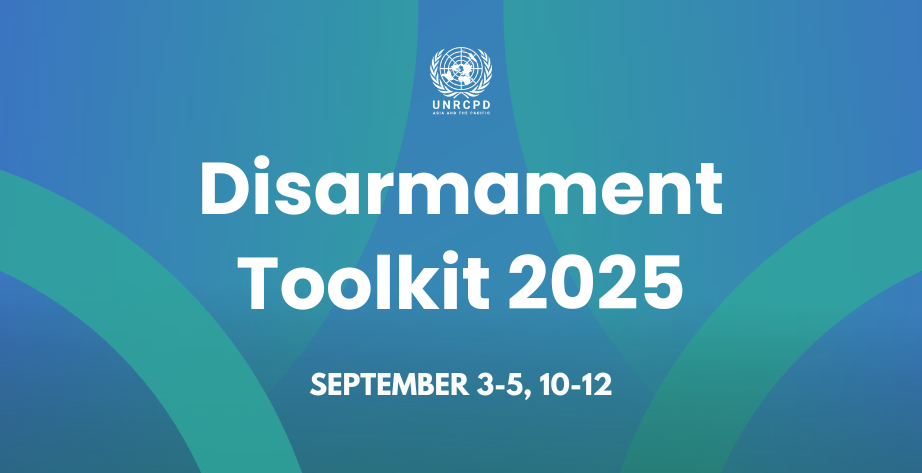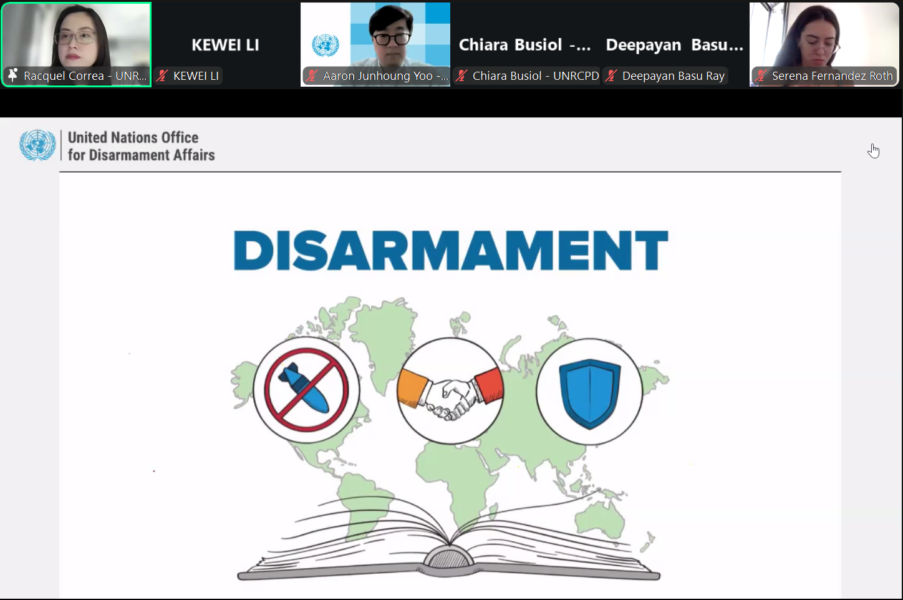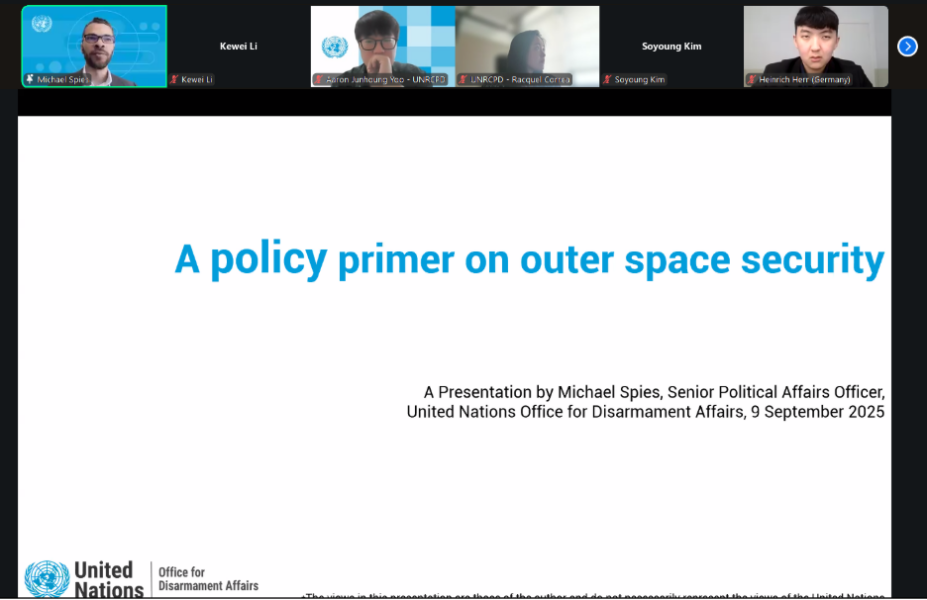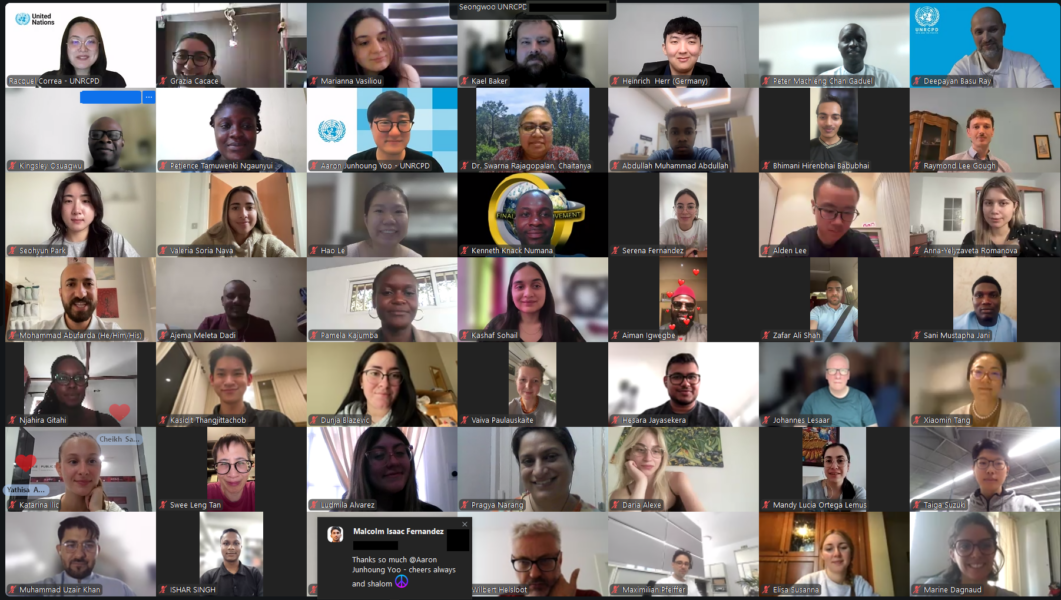From Nepal to Timor-Leste, Fiji to South Africa, more than 1,600 people joined the Disarmament Toolkit 2025—proof that young voices everywhere are ready to lead on peace

Disarmament is not just about eliminating weapons; it’s about shifting narratives of power, peace, and people,” wrote one participant from India. For another participant from South Africa, the key lesson was that “it’s not weapons that have brought about peace in the world, but the actions of people moving conversations forward.” From Nepal to Timor-Leste, from Fiji to South Africa, voices from the Disarmament Toolkit 2025 echoed the same truth: young people are not just the future of disarmament—they are already shaping its present, bringing urgency, creativity, and lived experience into global peace and security debates.
As an annual programme, the Toolkit makes complex issues of disarmament and peace more accessible to the public. In 2025, it brought together a record of 1,655 participants from 136 countries—more than double the number from last year. Many joined from across Asia and the Pacific, UNRCPD’s home region, stretching from Nepal to Timor-Leste, and from the Solomon Islands to Fiji. The course was distinctly youth-driven, with an average age of 26, most under 30 and a majority women, while intergenerational voices up to age 61 added depth. Beyond the region, the Toolkit also drew participants from Africa, Europe, Latin America, and the Middle East, highlighting its global reach and diversity of perspectives.
The 2025 edition—the fourth in the series—came at a time when global military spending is at record highs and conflicts are escalating, yet disarmament is still too often seen as abstract or out of reach. The Toolkit is designed to change that, breaking down complex issues of weapons, power, and peace into accessible lessons and conversations. It shows that these debates are not only about treaties or arsenals but also about reshaping priorities, redirecting resources for development, and amplifying the voices of young people and women who are already leading change. Organized by the United Nations Regional Centre for Peace and Disarmament in Asia and the Pacific (UNRCPD), in collaboration with Dr. Swarna Rajagopalan, Founder of Prajnya, it was held online from 3–5 and 10–12 September, bringing together participants for six interactive sessions.
This year’s edition also introduced new elements that further strengthened its role as a platform for accessible learning and inclusive dialogue. A new Thematic Session provided focused discussions on key cross-cutting topics, while the Regional Spotlight continued to offer participants the opportunity to examine disarmament challenges within specific regional contexts, bringing fresh perspectives and enriching the overall dialogue.
Day 1: Disarmament Agendas
The first day’s session served to introduce key disarmament agendas and prepare participants for the following disarmament discussions. Mr. Deepayan Basu Ray, Director of UNRCPD, delivered the opening remarks with expectations for the participants.
The first presentation was delivered by Ms. Racquel Correa, Associate Programme Management Officer at UNRCPD, who provided an overview of the disarmament agenda and explained how disarmament is linked to the Sustainable Development Goals. Her presentation outlined the broader disarmament framework and highlighted the work of the United Nations and the Office for Disarmament Affairs (UNODA) in promoting sustainable peace through disarmament, non-proliferation, and arms control.

Ms. Racquel Correa, Associate Programme Management Officer at UNRCPD, presenting on the foundations of disarmament
Following this, Dr. Swarna Rajagopalan, Director of Chaitanya Consultancy, turned the focus to gender, power and peace, underscoring the critical role of gender equality in advancing peacebuilding and disarmament. She emphasized the relevance of the Women, Peace and Security agenda, while stressing that inclusive approaches and diverse perspectives are essential to strengthening disarmament efforts.
The session then followed Youth, Peace and Security (YPS) in ASEAN and the wider Asia-Pacific, framed within the context of UNSCR 2250, 2419, and 2535. Ms. Erika Isabel Yague, Youth, Peace and Security Practitioner-Scholar, highlighted the transformative role of young people in promoting regional peace and security, emphasizing that youth must be recognized not only as beneficiaries but as partners and leaders in disarmament and peacebuilding. They underscored the importance of institutionalizing YPS alongside other global and regional disarmament frameworks to ensure sustainable and inclusive progress.

Day 2: Understanding Weapons of Mass Destruction
The day’s moderator, Mr. Aaron Junhoung Yoo, Deputy Director of UNRCPD, began the session by introducing the key issues on weapons of mass destruction, specifically nuclear, radiological, biological and chemical weapons.
The first speaker, Ms. Amanda Cowl, 1540 Regional Coordinator for Asia and the Pacific at UNODA, kicked off the day with a detailed presentation on multilateral approaches to nuclear disarmament. She explained the existing nuclear disarmament and non-proliferation regime, which includes multilateral treaties, regional instruments, bilateral agreements, and additional State-led initiatives.
The second speaker of the day, Ms. Fiona Simpson, Deputy Chief of the WMD Branch and Senior Political Affairs Officer at UNODA, gave us an overview of global nuclear disarmament and non-proliferation architecture. She highlighted key instruments such as the Treaty on the Non-Proliferation of Nuclear Weapons (NPT), the Treaty on the Prohibition of Nuclear Weapons (TPNW), and the Comprehensive Nuclear-Test-Ban Treaty (CTBT). Her remarks emphasized the continued relevance of these frameworks to advance international peace and security.
The discussion then shifted to Ms. Suzanna Khoshabi, Programme Officer at the Organization for the Prohibition of Chemical Weapons (OPCW). She outlined their definition and traced the history of their development, before turning to the pressing challenges facing national biosecurity. These include the threat of bioterrorism, gaps in policy and institutional structures, and limited awareness among scientists, decision-makers, and the private sector.
Dr. Clarissa Rios Rojas, Political Affairs Officer at UNODA Biological Weapons Convention Implementation Support Unit, provided an overview of the Biological Weapons Convention (BWC), outlining its objectives, scope, and relevance in today’s security landscape. Drawing attention to rapid advances in biotechnology, she noted both the opportunities for peaceful applications and the risks of misuse, underscoring the urgent need for sustained dialogue between scientists, policymakers, and security practitioners.

Ms. Fiona Simpson, Deputy Chief of the WMD Branch and Senior Political Affairs Officer at UNODA, presenting the nuclear disarmament treaties
The day wrapped up with a Regional Spotlight on South Asia, delivered by Dr. Pramod Jaiswal, Research Director at the Nepal Institute for International Cooperation and Engagement (NIICE). In his presentation, he examined the key challenges facing the region and highlighted how regional stability and a balanced distribution of power could serve as crucial foundations for advancing disarmament.

Day 3: Emerging Technologies & Outer Space
The sessions were moderated by Mr. Aaron Junhoung Yoo, Deputy Director of UNRCPD. He guided participants through key issues in disarmament and international security, from outer space governance to emerging technologies and cybersecurity. These topics, both technical and political, raise important questions for peace and security in the years ahead.
The first speaker for Day 3, Mr. Michael Spies, Deputy Chief of the Geneva Branch and Senior Political Affairs Officer at UNODA, provided a policy primer on outer space. He addressed the escalating competition in space, noting the sharp increase in space launches. He also emphasized the risks to current space infrastructure and explored the existing regulatory frameworks, while highlighting the challenges driven by the expanding use and contention in outer space.

Mr. Michael Spies, Deputy Chief of the Geneva Branch and Senior Political Affairs Officer at UNODA, presenting on the existing frameworks and the challenges of increased activity in outer space
The next presentation is delivered by Mr. René Holbach, Political Affairs Officer at UNODA Science, Technology and International Security Unit, focused on artificial intelligence and uncrewed aerial vehicles, among other issues. He explained the field of emerging technologies —examining dual-use innovations and why a responsible approach to development and governance is critical for peace and security.
Then moved on to the Regional Spotlight on Northeast Asia, presented by Dr. Soyoung Kim, Assistant Professor at Nagoya University of Commerce and Business. She discussed the pressing security dynamics in the region and underlined how both regional stability and a balanced power structure could contribute to advancing disarmament efforts.
The session concluded with a presentation from Ms. Katherine Prizeman, Political Affairs Officer at UNODA Science, Technology and International Security Unit. She spoke about the opportunities and risks associated with information and communications technologies (ICTs) and their implications for international security.

Day 4: Conventional Weapons and Armed Violence
The fourth day’s session, moderated by Mr. Aaron Junhoung Yoo, Deputy Director of UNRCPD, focused on Conventional Weapons and Armed Violence, covering humanitarian disarmament treaties, mine action, ammunition management, unregulated arms production and trafficking, and concluding with a Regional Spotlight on lessons from the Balkans.
The first speaker of the day, Ms. Alice Marzi, Associate Political Affairs Officer at UNODA Geneva Branch, delivered a presentation on key instruments of humanitarian disarmament. She explained how frameworks collectively seek to reduce civilian harm from conventional weapons, highlighting their humanitarian objectives and the importance of strengthening compliance and implementation.
Secondly, Mr. Llewelyn Jones, Asia Pacific Regional Director of Mines Advisory Group (MAG), introduced Humanitarian Mine Action and Weapons and Ammunition Management, focusing on humanitarian mine action and the safe, secure management of conventional ammunition stockpiles.
Ms. Monalisa Hazarika, Strategic Communications and Partnerships Officer at SCRAP Weapons and UNODA Youth4Disarmament Alumna, presented craft-produced weapons from a global perspective. She explained the issue of unregulated production, particularly the rise of craft-produced weapons, and how this trend poses challenges to existing arms control frameworks.
The next speaker is Mr. Aaron Junhoung Yoo, Deputy Director of UNRCPD, his presentation focused on countering arms trafficking and how global instruments can work together more effectively. He highlighted the challenges of unregulated arms production and illicit trade, discussed ways to improve coordination among international frameworks, and stressed the need to strengthen implementation to reduce armed violence.
Mr. Dragan Bozanic, Gender and Research Project Analyst at South Eastern and Eastern Europe Clearinghouse for the Control of Small Arms and Light Weapons (UNDP SEESAC), closed the day by sharing a regional spotlight on the Balkans, highlighting lessons learned in arms control, gender perspectives, and regional cooperation.

Mr. Dragan Bozanic, Gender and Research Project Analyst at South Eastern and Eastern Europe Clearinghouse for the Control of Small Arms and Light Weapons (UNDP SEESAC), presenting on Regional Spotlight: Balkans

Day 5: Power, Patriarchy, Politics and Peace
Day 5 was moderated by Dr. Swarna Rajagopalan, Director of Chaitanya Consultancy, who embarked on an interesting discussion on the linkages of disarmament with power, patriarchy, politics and peace.
The first segment was conducted as a panel-discussion with three distinguished speakers: Dr. Asha Hans, President of Sansristi and former Professor of Political Science and Founder Director School of Women’s Studies at Utkal University, Dr. Andrea Ellner, Lecturer in Defense Studies at the King’s College London (KCL), and Dr. Sorcha MacLeod, Associate Professor at the University of Copenhagen. Topics included the impact of armed conflict on various groups, gender-based violence, refugee crisis, human rights violations and war crimes were discussed.
The next segment of the day was led by Dr. Julia Palik, Senior Researcher at Peace Research Institute Oslo (PRIO), who focused on the thematic session “Where Are the Women in Disarmament, Demobilization, and Reintegration (DDR) Processes?”, highlighting women’s participation, gender perspectives, and challenges in DDR processes.

Roundtable discussion on States, Markets, and Arms Industries
Day 6: Peace and Disarmament Fair: From Learning to Doing
The final day was moderated by Ms. Racquel Correa, Associate Programme Management Officer at UNRCPD, who led participants through a series of exchanges focused on turning knowledge into action.
The first segment of the day was a keynote delivered by Ms. Sadia Tasleem, Lecturer at Quaid-e-Azam University. She introduced key trends in international security, the challenges facing disarmament, and ways to advance disarmament discourse, while highlighting signs of hope for the next generation of leaders. Her keynote set the tone for the day, providing a bridge to the UN, CSO, and youth perspectives that followed, and framing the multi-stakeholder dialogue for the rest of the session.
The second presentation was delivered by Mr. James Cooke, UNODA Programme Manager of the Youth Leader Fund for a World without Nuclear Weapons, on the theme “Building Pathways for Young People in Disarmament.” He focused on the institutional perspective, outlining how established frameworks and organizations can create opportunities for young people to engage in disarmament initiatives.

Mr. James Cooke, UNODA Programme Manager of the Youth Leader Fund for a World without Nuclear Weapons, presenting on how to build Pathways for Young People in Disarmament
The next session was presented by Ms. Bianca Pabotoy, Asia-Pacific Network Member of the International Action Network on Small Arms (IANSA), on “Gender and Disarmament: Lessons from Civil Society.” She shared insights on advocacy strategies, grassroots initiatives, and entry points for civil society in disarmament work. Drawing from her experience, she highlighted how gender perspectives can strengthen disarmament efforts and demonstrated the critical role of community-led action in driving meaningful change.
The segment continued with an Interactive Panel – Youth Voices, designed not as a separate youth-only session but as a continuation of the dialogue. Three youth speakers were invited to share their perspectives and practice-based insights: Mr. Safayet Zamil Nowshan, alumnus from Youth4Disarmament, Ms. Kashaf Sohail, representative from the CTBTO Youth Group, and Ms. Elisa Shafiqah Binti Shahrilnizam, diplomacy practitioner and public policy expert.
The youth panel reflected on what first drew them to disarmament, the challenges they faced as young voices in global policy spaces, and how they navigated these obstacles. The young speakers also offered advice for peers outside formal networks on contributing to peace and disarmament at the local level. The discussion underscored the vital role of youth in shaping international security by bringing new insights, lived experience, and practical solutions, strengthened through mentorship, access, and intergenerational solidarity.
The Disarmament Toolkit 2025 concluded with closing remarks delivered by Mr. Deepayan Basu Ray, Director of UNRCPD. He highlighted how the Toolkit has expanded from 50 participants in its first edition in 2022 to more than 1,650 this year, underscoring the growing global demand for disarmament education and dialogue. He also encouraged participants to carry this momentum forward, reminding them that the future of peace and security will be shaped by their ideas, energy, and leadership.

As planning begins for the next edition of the Disarmament Toolkit, we want to hear from you. What topics, regions, or themes should we spotlight in 2026? Share your ideas or write to us directly at unrcpd-info@un.org. Your insights will help us shape the next Toolkit and ensure it remains a platform where diverse voices can learn, connect, and lead on disarmament and peace.

